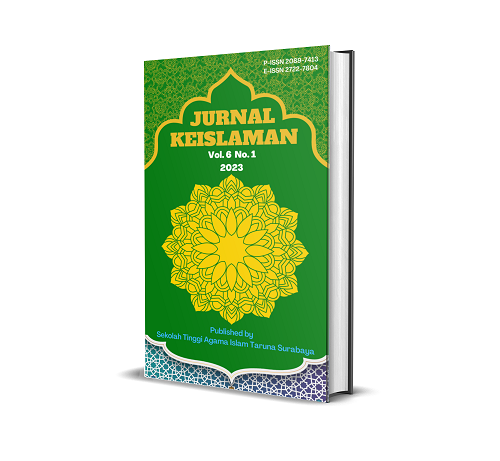Akad Tidak Bernama Dalam Hukum Kontrak Bisnis Syariah
Abstract
Studying unnamed contracts is an important requirement for economic business actors, especially sharia economic actors. The rapid development of the economy and business requires business actors to study unnamed contract forms in sharia business practices in order to respond to the challenges of the times. This research will examine unnamed contracts in sharia business contract law. This type of research is library research, which is a study by examining data from various literature. The results of the study show that unnamed contracts are contracts that are not specifically regulated in fiqh books and do not have special provisions. This contract is made and determined by the parties according to their needs. The provisions that apply in this contract refer to the provisions of the general theory of the contract (naẓriyyat al-'aqd) and are guided by the principle of freedom of contract (mabda' ḥurriyat at-ta'Äqud). An example of an unnamed contract is istishnÄ', bai al -wafa, istijrÄr, tahkÄ«r, book publishing contracts, advertising contracts, auction contracts, fiduciary contracts, leasing contracts, franchising contracts, consignment contracts, lease purchase agreements and others.References
Anwar, Syamsul, HUKUM PERJANJIAN SYARIAH: STUDI TENTANG TEORI AKAD DALAM FIQIH MUAMALAT, Jakarta: Rajawali Press, 2007.
Anwar, Syamsul, STUDI HUKUM ISLAM KONTEMPORER BAGIAN DUA, Yogyakarta: UAD Pres, 2019.
az-Zuhaili, Wahbah, AL-FIQHU AL-ISLÄ€M WA ADILLATUHU, Beirut: Darul Fikr, 1995.
Dewi, HUKUM PERIKATAN ISLAM INDONESIA, Yogyakarta: Gadjah Mada University Press, 2018.
Faizin, Muadil, HUKUM PERIKATAN ISLAM DI INDONESIA, Lampung:Pustaka Warga Press, 2020.
Hasan, Zubairi, UNDANG-UNDANG PERBANKAN SYARIAH: TITIK TEMU HUKUM ISLAM DAN HUKUM NASIONAL, Jakarta: Rajawali Press, 2009.
Iwan, METODE PENELITIAN KUANTITATIF, KUALITATIF DAN MIXED METHOD, Kuningan: Hidayatul Quran, 2019.
Jamil, Fathurrahman, PENERAPAN PERJANJIAN DALAM TRANSAKSI PADA LEMBAGA KEUANGAN SYARIAH, Jakarta: Sinar Grafika, 2012.
Kompilasi Hukum Ekonomi Syariah (KHES).
Majid, Abdul, NADZARIYYAT AL-AQDI FĪ FIQHIL ISLĀMY, Beirut: Darul Kutub Ilmiyyah, 2009.
Mardani, HUKUM PERIKATAN SYARIAH DI INDONESIA, Jakarta: Sinar Grafika, 2022.
Mardani, HUKUM KONTRAK KEUANGAN SYARIAH DARI TEORI KE APLIKASI, Jakarta: Kencana, 2021.
Mawarti, Herin dkk, PENGANTAR RISET, Medan: Yayasan Kita Menulis, 2021.
Meleong, J. Lexi, METODE PENELITIAN KUALITATIF, (Bandung: PT. Remaja Rosdakarya, 2019.
Mujahidin, Ahmad, HUKUM PERBANKAN SYARIAH, Jakarta: PT. Raja Grafindo, 2016.
Muhammad, Abdul Aziz, FIQIH MUAMALAT SISTEM TRANSAKSI DALAM FIQIH ISLAM, Jakarta: Amzah Press, 2011.
Nopriansyah, Waldi, HUKUM BISNIS DI INDONESIA, Jakarta:Kencana-Prenada Media Group, 2019.
Pasaribu, Chairuman, HUKUM PERJANJIAN DALAM ISLAM, Jakarta: Sinar Gafika, 2004.
Peraturan Mahkamah Agung (MA) Nomor 2 Tahun 2008 Tentang KHES, Pasal 23-25
Undang-Undang No. 21 Tahun 2008 tentang perbankan syariah.
Undang-Undang No. 19 tahun 2008 tentang Surat Berharga Syariah Negara (SBSN).
Yasardin, ASAS KEBEBASAN BERKONTRAK SYARIAH, Jakarta: Kencana, 2018.
Copyright (c) 2023 Rudiansyah Rudiansyah, Syaiful Anam

This work is licensed under a Creative Commons Attribution-ShareAlike 4.0 International License.
Authors who publish with this journal agree to the following terms:
- Authors retain copyright and grant the journal right of first publication with the work simultaneously licensed under a Creative Commons Attribution-ShareAlike that allows others to share the work with an acknowledgement of the work's authorship and initial publication in this journal.
- Authors are able to enter into separate, additional contractual arrangements for the non-exclusive distribution of the journal's published version of the work (e.g., post it to an institutional repository or publish it in a book), with an acknowledgement of its initial publication in this journal.
- Authors are permitted and encouraged to post their work online (e.g., in institutional repositories or on their website) prior to and during the submission process, as it can lead to productive exchanges, as well as earlier and greater citation of published work (See The Effect of Open Access).






















